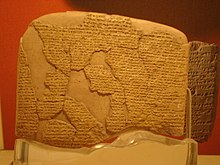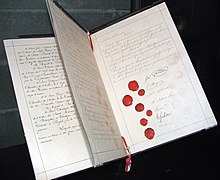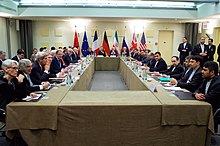Diplomacy
Diplomacy comprises spoken or written communication by representatives of state, intergovernmental, or non-governmental institutions intended to influence events in the international system.[1][2] Diplomacy is the main instrument of foreign policy which represents the broader goals and strategies that guide a state's interactions with the rest of the world.This established history has in recent years been criticized by scholars pointing out how the term originates in the political context of the French Revolution.[5][6][additional citation(s) needed] Some of the earliest known diplomatic records are the Amarna letters written between the pharaohs of the eighteenth dynasty of Egypt and the Amurru rulers of Canaan during the 14th century BC.[citation needed] The ancient Greek city-states on some occasions dispatched envoys to negotiate specific issues, such as war and peace or commercial relations, but did not have diplomatic representatives regularly posted in each other's territory.In times of peace, diplomacy was even conducted with non-Hellenistic rivals such as the Achaemenid Empire of Persia, though it was ultimately conquered by Alexander the Great of Macedon.Alexander was also adept at diplomacy, realizing that the conquest of foreign cultures would be better achieved by having his Macedonian and Greek subjects intermingle and intermarry with native populations.[7] Interactions between various merchants, diplomats and clergymen hailing from the Italian and Ottoman empires helped inaugurate and create new forms of diplomacy and statecraft.Eventually the primary purpose of a diplomat, which was originally a negotiator, evolved into a persona that represented an autonomous state in all aspects of political affairs.He lived during a time in which rival states were starting to pay less attention to traditional respects of tutelage to the Zhou dynasty (c. 1050–256 BC) figurehead monarchs while each vied for power and total conquest.However, a great deal of diplomacy in establishing allies, bartering land, and signing peace treaties was necessary for each warring state, and the idealized role of the "persuader/diplomat" developed.There was also a triad of warfare and diplomacy between these two states and the Tangut Western Xia dynasty to the northwest of Song China (centered in modern-day Shaanxi).[citation needed] Long before the Tang and Song dynasties, the Chinese had sent envoys into Central Asia, India, and Persia, starting with Zhang Qian in the 2nd century BC.Since the Tang dynasty (618–907 AD), the Chinese also became heavily invested in sending diplomatic envoys abroad on maritime missions into the Indian Ocean, to India, Persia, Arabia, East Africa, and Egypt.This work comprehensively studies state governance; it urges non-injury to living creatures, or malice, as well as compassion, forbearance, truthfulness, and uprightness.[citation needed] Byzantium's "Bureau of Barbarians" was the first foreign intelligence agency, gathering information on the empire's rivals from every imaginable source.[13] While on the surface a protocol office—its main duty was to ensure foreign envoys were properly cared for and received sufficient state funds for their maintenance, and it kept all the official translators—it clearly had a security function as well.Diplomats and historians often refer to a foreign ministry by its address: the Ballhausplatz (Vienna), the Quai d'Orsay (Paris), the Wilhelmstrasse (Berlin), Itamaraty (Brasília), and Foggy Bottom (Washington, D.C.).[20] In times of hostility, diplomats are often withdrawn for reasons of personal safety, as well as in some cases when the host country is friendly but there is a perceived threat from internal dissidents.[25] Debt-trap diplomacy is carried out in bilateral relations, with a powerful lending country seeking to saddle a borrowing nation with enormous debt so as to increase its leverage over it.[27][28] Humanitarian diplomacy is the set of activities undertaken by various actors with governments, (para)military organizations, or personalities in order to intervene or push intervention in a context where humanity is in danger.It involves monitoring assistance programs, promoting respect for international law, and engaging in advocacy in support of broader humanitarian goals".It is also understood that circumstances may exist in which the consensual use of force (notably preventive deployment) might be welcomed by parties to a conflict with a view to achieving the stabilization necessary for diplomacy and related political processes to proceed.For example, South Africa is described as engaging in quiet diplomacy with neighboring Zimbabwe to avoid appearing as "bullying" and subsequently engendering a hostile response.This approach can also be employed by more powerful states: U.S. President George W. Bush's nonattendance at the 2002 World Summit on Sustainable Development constituted a form of quiet diplomacy, in response to the lack of UN support for the U.S.' proposed invasion of Iraq.[citation needed] Science diplomacy[44] is the use of scientific collaborations among nations to address common problems and to build constructive international partnerships.However, science diplomacy has become an umbrella term to describe a number of formal or informal technical, research-based, academic or engineering exchanges, with notable examples including CERN, the International Space Station, and ITER.Soft power, sometimes called "hearts and minds diplomacy", as defined by Joseph Nye, is the cultivation of relationships, respect, or even admiration from others in order to gain influence, as opposed to more coercive approaches.[45] A country's soft power can come from three resources: its culture (in places where it is attractive to others), its political values (when it lives up to them at home and abroad), and its foreign policies (when they are seen as legitimate and having moral authority).[46] Especially today, city administrations and networks are increasingly active in the realm of transnationally relevant questions and issues ranging from the climate crisis to migration and the promotion of smart technology.















DiplomaticsDiplomacy (disambiguation)Conflict resolutionNonviolenceArbitrationAuctionConciliationDispute resolutionRule of lawCollaborativeMediationParty-directedNonviolent CommunicationPacifismNegotiationSpeaking truth to powerConflict managementViolenceCommunal violenceConflict escalationDe-escalationJust war theorystudiesInternational relationsAppeasementArmisticeBrinkmanshipCeasefireDeterrenceMultilateralismNuclear warfareNuclear blackmailMutual assured destructionNuclear disarmamentNuclear proliferationAlternative dispute resolutionAnti-war movementConflict avoidanceConflict continuumConflict style inventoryDemocracyFamily therapyForum (alternative dispute resolution)Game theoryPrisoner's dilemmaParadox of toleranceLiaison officerNon-aggression principlePeace and conflict studiesPeace processPeace treatyPeacebuildingPeacemakingRule of manTrack II diplomacyWinston ChurchillPrime Minister of the United KingdomFranklin D. RooseveltJoseph StalinGeneral Secretary of the Soviet UnionYalta Conferenceintergovernmentalnon-governmentalforeign policytreatiesagreementsalliancesnegotiationsofficialsVienna Convention on Diplomatic Relationsaccredited officialsenvoysdedicated foreign affairs officediplomatic missionsFrench RevolutionDiplomatic historyEgyptian–Hittite peace treatyNew Kingdomancient EgyptHittite EmpireAnatoliaAmarna letterseighteenth dynasty of EgyptAmurruCanaanMesopotamianLagashBattle of Kadeshnineteenth dynastyancient Greek city-statesproxenosAchaemenid EmpireAlexander the GreatMacedonianSogdianBactriaRoxanaSogdian RockHellenistic statesPtolemaic KingdomSeleucid Empiremarriage alliancesForeign relations of the Ottoman EmpireOttomanPera MuseumIstanbulOttoman EmpireSublime Portemaritime republicsVenicestatecraftsovereignsForeign relations of imperial ChinaSino-Roman relationsEuropeans in Medieval ChinaJesuit missions in ChinaLuso-Chinese agreementNanban tradeHaijinSakokuMacartney Embassyinternational relations theorySun TzuThe Art of WarZhou dynastyBattle of Baideng